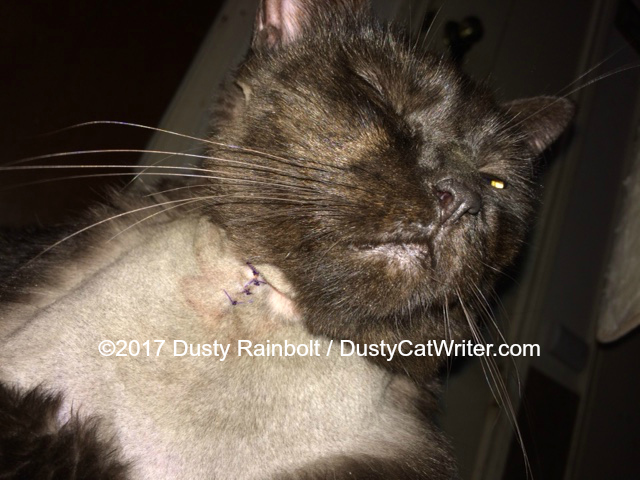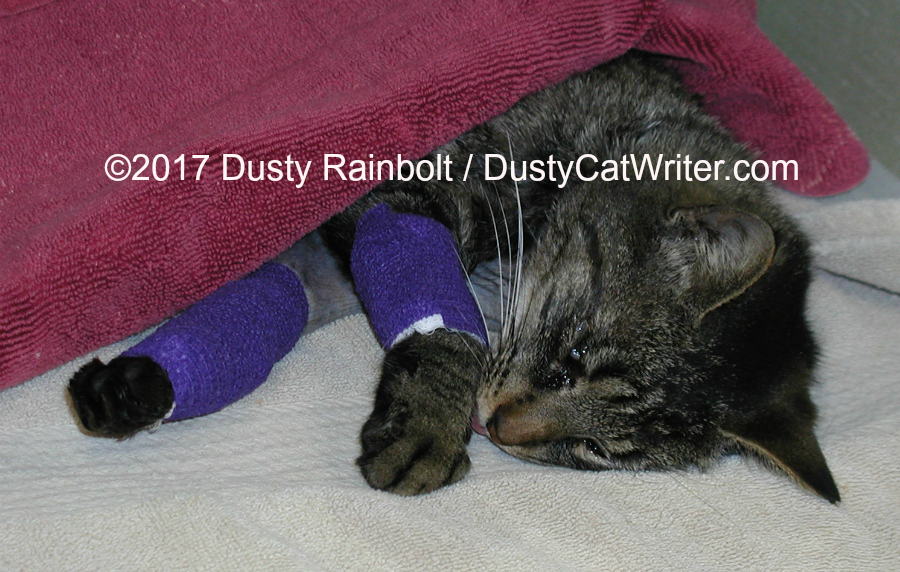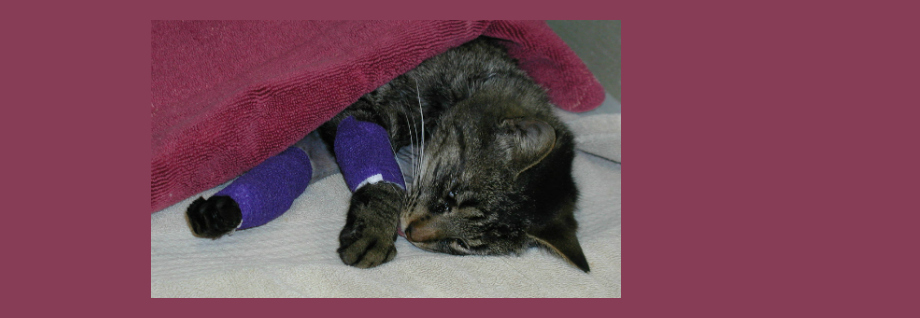
A week ago, I found a lump on the throat of our foster failure, Shady. I took her to my vet, who scheduled surgery for the following morning. Dr. Cassie Epstein (a shameless plug for the fabulous Animal Hospital on Teasley Lane in Denton, TX) removed the 3 mm by 2.5 mm mass located under Shady’s jugular vein. The next morning Dr. Cassie cleared Shady to go home. The bulky black feline looked like she was geared for Halloween with her shaved side and stitches. As Dr. Cassie handed me the carrier, she gave me the instructions for Shady’s after-surgery care. Fortunately, she didn’t require much. “Watch the incision for signs of swelling or redness.” “Are you sure? No pills, changing dressing, cleaning the wound. Nothing?” I ask a lot questions because I’ve been to vets who give vague instructions or none at all.

Years ago, on a holiday weekend I rushed Oliver, a six-month-old foster kitten, to an emergency clinic for drooling and severe dehydration. The pricey clinic diagnosed him with a lesion on his tongue and treated him with intravenous (IV) fluids. They released him to me with a self-adhering bandage wrapped around his front leg where they had given him the IV. There were no written instructions, so I took notes. The vet tech said the kitty should be okay and leave the bandage on his leg to prevent bleeding. She never said anything about how long the wrap should remain on the kitten’s paw. By the time I arrived home, the paw was swollen twice its normal size. I immediately took the wrap off and returned to the clinic. The vet tech said I should have taken the dressing off after I got in the car. I looked at my notes. She hadn’t said that. In retrospect, I should have ask how long to keep the wrap on the leg. That day I learned a very valuable lesson: Never be afraid to ask questions, especially about post-surgery care.

After-Surgery Care Questions
Request written instructions about any medicine and care you have to give your kitty. To provide the best after-surgery care possible, here are four topics you should ask before you bring Fluffy (or Fideax) home after surgery:
#1 Activity Restrictions
Can Fluffy immediately resume normal activities like climbing the cat tree and jumping on the bed? If he’s just been neutered, it’s a good chance he can, but if he had abdominal or orthopedic surgery, no way. Normal activities may take two or even six weeks.
- Does he need to be confined to a cage or will a bathroom do? When can he have the run of the house?
- When can he start chasing and leaping at his feather toy?
- Can the kids hold him?
#2 Care Instructions
- How long will he be tender or painful?
- What do I need to do to care for the surgical site?
- Does the dressing need to be changed?
- What if the bandage gets wet or dirty?
- What complications should I look out for? Swelling? Redness? Tenderness? Oozing? Vomiting? Foul odor?
- Most kitties will want to lick the stitches. How long does he need to wear an Elizabethan collar? Does he need a hard plastic lampshade or can he wear a flexible one? Can I apply bitter apple to prevent licking?
#3 Medications
- List medicines, doses and frequency. What does each medication do for my cat? What side effects or reactions could be expected?
- Can I give all the medicines at the same time or must I stagger them?
- Do I give them with food or on an empty stomach?
#4 Food issues
- Are there any food restrictions?
- How often should he eat?
When to Worry
Call your vet if:
- Your kitty is losing weight
- He acts lethargic
- He stops eating
- You smell a foul odor
- You see redness or swelling at the incision site.
Did I leave anything out? If I did, please let me know in the comments section below.










My kitty had a lump near his shoulder blades removed. He is active, purrs, has used his litter but not interested in food. Plus he coughed, that sort of bronchial sort of cough a bit ago. This is a wonderful kitty, I am worried.
Hi Michel. Poor kitty. I have to admit, I’d be worried too. It’s very important you take your kitty back to the vet as soon as you can. Refusing to eat could be a sign of something serious going on. It could lead to fatty liver disease. The sooner you go to the vet, the better the chance that they can help her. Is there a reason you haven’t been able to take her yet?
Michele, did you take your kitty to the vet? How is he?
Thank you for replying. That was when I first brought him home. He is healing well and his lump was benign. Is there a particular area shots are to be given or should not?
Thanks for the info. Informed patient advocates improve quality of care for all!
Thank you for this info. Informed and questioning patient advocates increases the quality of care for all.